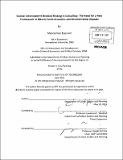Coastal development decision-making in Costa Rica : the need for a new framework to balance socio-economic and environmental impacts
Author(s)
Esquivel, Maricarmen
DownloadFull printable version (13.50Mb)
Other Contributors
Massachusetts Institute of Technology. Dept. of Urban Studies and Planning.
Advisor
Lawrence E. Susskind.
Terms of use
Metadata
Show full item recordAbstract
Costa Rica needs to pay attention to the rapid change that coastal regions have been undergoing as a result of tourism and real estate projects. Despite the economic benefits in terms of jobs and foreign investment, many have raised concerns over construction in high slopes, approval of projects without the necessary water and wastewater infrastructure, deforestation, and the displacement of the local population. Is there a way to promote development in coastal areas of Costa Rica while still preserving the natural environment and benefiting coastal communities in the long term? What is the process currently in place to determine a project's potential impacts, and what changes need to be done to this process in order to make sustainability more likely? To answer these questions, this thesis studies the Environmental Assessments conducted for three tourism and real estate projects in the Pacific Coast of Costa Rica to determine how environmental, economic, and social tradeoffs have been made in practice. The analysis shows weak assessments, lack of push-back from government agencies and inadequate monitoring, and a high number of legal complaints that have not been sufficient to incentivize good practices. As coastal areas are being urbanized, Costa Rica has embarked on an ambitious effort to improve the cadastre and land use plans of these areas, in part to give more security to foreign investors. A window of opportunity currently exists to improve the sustainability framework in the country, including strengthening the National Environmental Technical Secretariat and the Environmental Administrative Tribunal, updating environmental assessment regulations, and enhancing land use planning capacity. These recommendations should be implemented through a collective effort led by the Ministry of Environment, and including other relevant government agencies, local and international environmental NGOs, universities, the private sector, and local communities. Having clearer rules for development in coastal areas will ultimately benefit all stakeholders.
Description
Thesis (M.C.P.)--Massachusetts Institute of Technology, Dept. of Urban Studies and Planning, 2011. Cataloged from PDF version of thesis. Includes bibliographical references (p. 122-129).
Date issued
2011Department
Massachusetts Institute of Technology. Department of Urban Studies and PlanningPublisher
Massachusetts Institute of Technology
Keywords
Urban Studies and Planning.